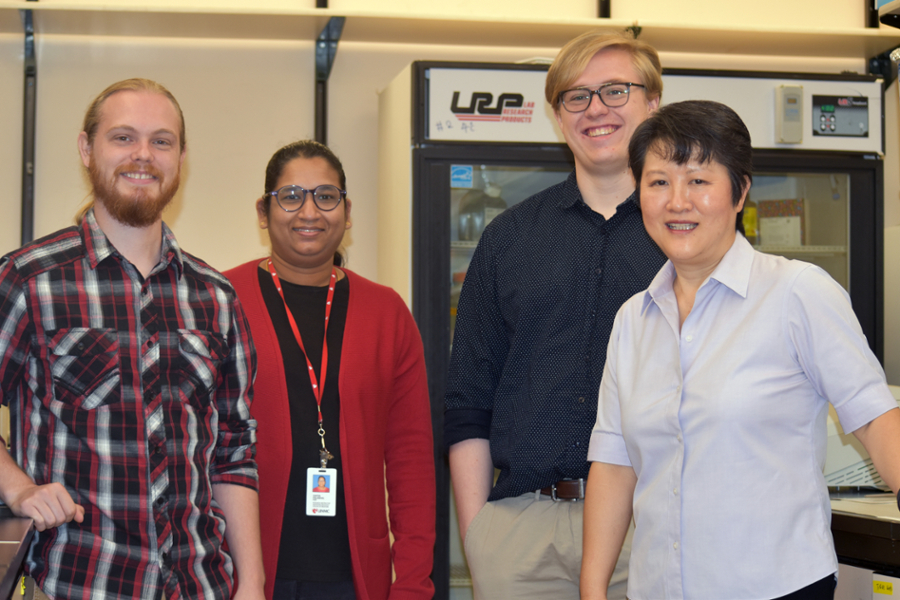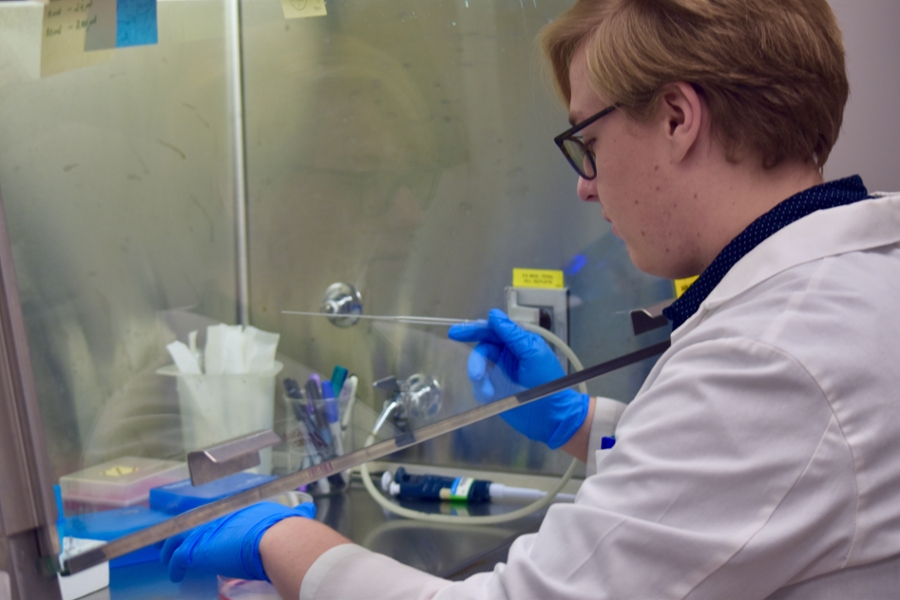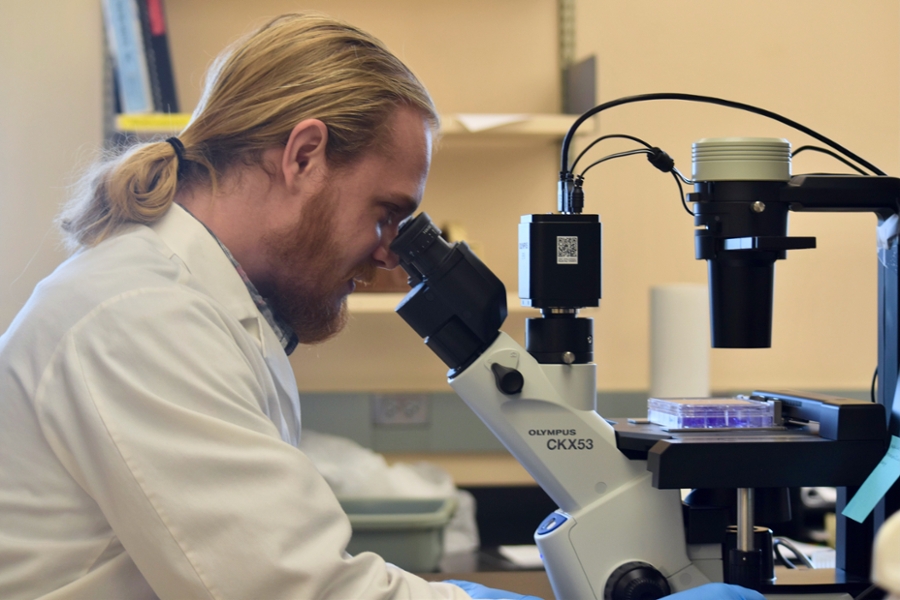Ying Yan, PhD

General Research Interests
- Protein kinases and phosphatases
- Cell signaling pathways in tumorigenesis and cancer metastasis
- Cell cycle regulation, DNA damage response, and stress-activated cellular aging
- Discovering new anti-cancer agents
- Ultra-high dose rate of radiation therapy (FLASH-RT).
Project 1
PP2A Ser/Thr phosphatase in pancreatic cancer
The goal of this research is to decipher the roles of PP2A Ser/Thr phosphatase complexes in oncogenic signaling networks in the context of the tumorigenesis and progression of pancreatic cancer. Pancreatic cancer is one of the most lethal cancers. Despite extensive research, there are no effective targeted therapies for this disease. PP2A is a family of holoenzymes that serves as the main source of Ser/Thr phosphatase activities in human cells. We have identified PR55α, a PP2A regulatory subunit, as an important new player in promoting pancreatic cancer. Our studies revealed that PR55α promotes the activation of the YAP oncogenic signaling pathway in pancreatic cancer and is required for both tumorigenicity and metastasis of pancreatic cancer. Our studies also revealed that PR55α is negatively regulated by the p53 tumor suppressor. Currently, we are investigating the mechanisms by which PR55α controlled PP2A activity promoting pancreatic cancer tumorigenesis and progression. Our long-term goal is to develop PR55α-based targeting approaches for pancreatic cancer treatment.
Project 2
Discovering novel chemotherapeutics for metastatic breast cancer
The goal of this research is to develop a new line of effective treatments for metastatic breast cancer to reduce the high mortality rate associated with metastatic breast cancer. Ninety percent of breast cancer patients die because of metastatic breast cancer. Antimitotic agents emerged as some of the most successful anticancer drugs in the treatment of metastatic breast cancer. However, the efficacy of these drugs is frequently limited by the primary or acquired resistance and severe side effects. Thus, there is a critical need for developing new microtubule-targeting agents that are safer and can operate via different mechanisms of action to treat resistant breast cancer. N-[5-(3’-halobenzoyl)-1H-benzimidazol-2-yl]carbamates fit the need, as it inhibits tubulin assembly by competing for the colchicine site, which is a different mechanism from the clinical antimitotic agents. It is also proven to be clinically safe. Based on this platform, we are developing an effective and safe anti-metastatic breast cancer treatment.
Project 3
Development of ultra-high dose-rate (Flash) cancer radiotherapy
The goal of this project is to elucidate the mechanisms of FLASH-radiation therapy (RT) in normal tissue protection and the translational value of the FLASH-RT modality in cancer treatment. The multi-PI project led by Dr. Sumin Zhou, and Dr. Ying Yan is built based upon the unique resources and complementary expertise of Dr. Zhou’s group in radiation-dosimetry and Modeling and Dr. Yan’s group in radiation/cancer biology. RT is a core modality of cancer treatment. Conventional (CONV)-RT delivers a total dose of 40-80 Gy with 1.8-3 Gy/daily at ≲0.4-Gy/second dose rate. RT destroys cancer cells mainly by causing double-strand DNA breaks, whereas achieving a sufficient RT dose to eradicate all cancer cells is often limited by collateral damage to normal tissues. Thus, there is a need for strategies that can increase RT-dose for cancer treatment without escalating normal tissue damage. Radiation delivered at ≥40-Gy/second (FLASH) offers such an opportunity, as it has been shown to protect normal tissue while maintaining a similar killing of cancer cells as CONV-RT. However, the mechanism and translational value of this FLASH-RT effect have remained mostly unknown. To attain our objective, we will elucidate the FLASH-RT biological effect with normal and cancer cellular models and compare FLASH-RT vs. CONV-RT for anti-tumor efficacy and in normal tissue toxicity with tumor mouse models. Successful completion of the studies will generate key data for understanding the FLASH-RT effect and demonstrate a proof-of-concept of an innovative FLASH-RT modality for cancer treatment.
Project 4
Targeting Rac1 for chemo/radio-sensitization of triple-negative breast cancer
The goal of this research is to elucidate Rac1-activated prosurvival signaling pathways in Triple-negative breast cancer (TNBC) cells and evaluate Rac1 inhibition-based strategies for chemo/radio-sensitization of TNBC. TNBC has the worst clinical outcome among all breast cancer subtypes. Because TNBC lacks the expression of ER, PR, and HER2 hormone receptors, there are no targeted therapies available for TNBC patients. Chemo/radiation eradicates cancer cells mainly by causing double-strand DNA breaks, whereases they also can activate multiple prosurvival pathways that promote therapy resistance, notably the ATM/ATR, ERK, and NFκB, pathways known to promote DNA repair, apoptosis inhibition, and cancer stem cell preservation. Our studies have identified that Rac1 GTPase is overexpressed in human TNBC cells and further activated by chemo/radiation. Furthermore, inhibition of Rac1 abrogates multiple prosurvival signaling pathways and sensitizes TNBC cells to chemo/radiation treatment. Currently, we are evaluating Rac1’s value as a therapeutic target for improving TNBC treatment.
Research support
2021–2025 NIH/NIGMS/R01GM143329
- Title: PR55-alpha controlled PP2A in the regulation of the Hippo/YAP pathway
- Principal Investigator: Ying Yan
2021–2024 U.S. Army/USAMRAA/CDMRP/W81XWH2110700
- Title: Effective oral benzimidazole carbamates for the treatment of metastatic breast cancer
- Principal Investigator: Ying Yan
2021-2023 University of Nebraska Collaboration Initiative Program - Pilot Project
- Title: Development of ultra-high dose-rate (FLASH) cancer radiotherapy
- Principal Investigators: Ying Yan, Sumin Zhou, and Donald Umstadter (UNL)
2021–2023 Great Plains IDeA-CTR-Pilot Projects Program - Pilot Project
- Title: FLASH-radiation therapy for increasing therapeutic index of cancer treatment
- Principal Investigators: Ying Yan, Sumin Zhou, and Donald Umstadter (UNL)
2016-2023 NIH/NCI/R01CA206444
- Title: Rac1 GTPase in tumorigenesis and progression of pancreatic cancer
- Principal Investigators: Michel M. Ouellette and Surinder K. Batra
- Role: Co-Investigator
2021–2022 NE-DHHS (2022-59)
- Title: Negative regulation of PR55α protein stability by p53 tumor suppressor
- Principal Investigator: Ying Yan
2021-2022 NE-DHHS (2022-42)
- Title: Rho GTPases in the radioresponse of pancreatic cancer
- Principal Investigator: Michel Ouellette
- Role: Co-Investigator
2014–2019 NIH/NCI/P50 CA127297
- Title: SPORE in Pancreatic Cancer
- Principal Investigator: Michael A. Hollingsworth
- Role: Co-Investigator
2017–2018 Nebraska Center for Cellular Signaling (P30 GM106397) - Pilot Project
- Title: Role of Rho GTPases in the radioresponse of pancreatic cancer
- Principal Investigators: Michel M. Ouellette and Ying Yan



Student research opportunities in Dr. Yan's lab
- Graduate Students
- Undergraduate students
- Summer Research Students (Undergraduate/Medical Students)